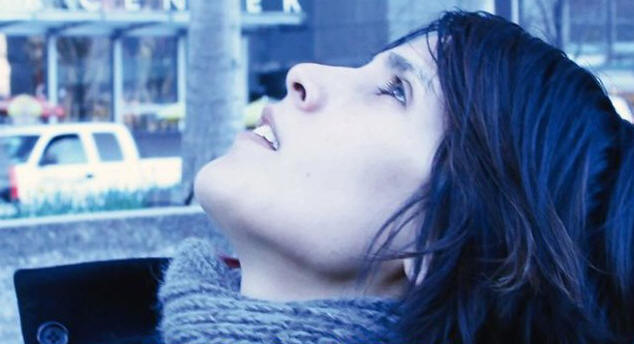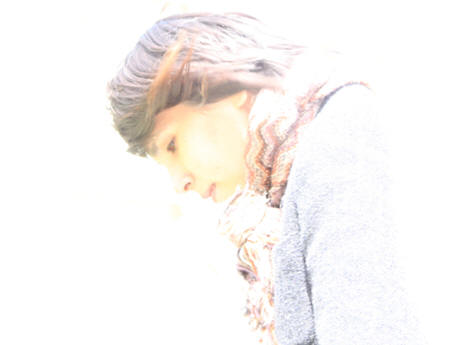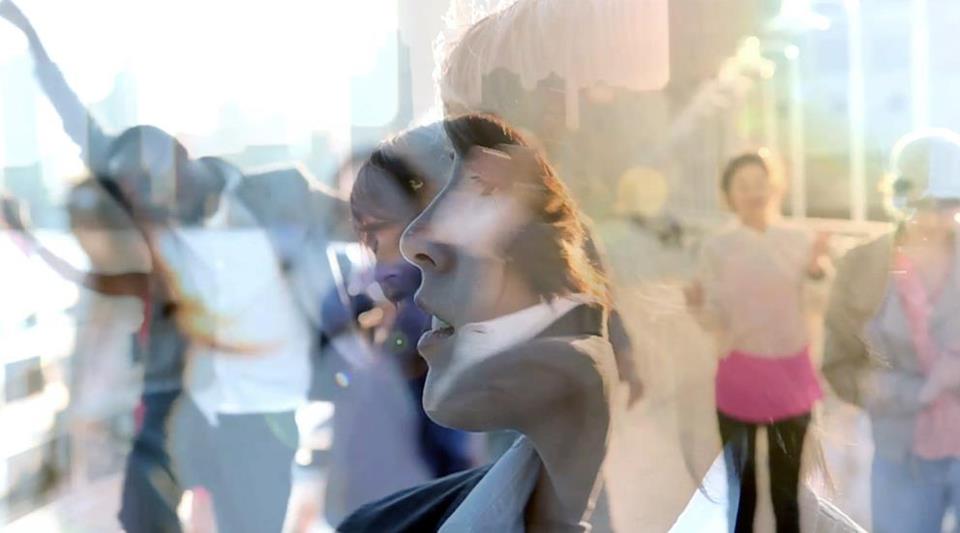Back in 1988, Tanita Tikaram released Ancient Heart,
arguably one of the forgotten defining albums of the decade. The most amazing
part was that the album was the debut of a 19-year old British singer. Tanita Tikaram became a star in her native land, spawning four hit
singles from the album, including "Twist In My Sobriety," which has
become something of an alternative standard.
Her music also got a good amount of love from the alternative community
in the US.
In the years that immediately followed, Tikaram released
four more albums in a matter of seven years, and while they got very
good reviews and some airplay, none quite captured the world's
imagination like her first shot. Therefore at the grand old age of 26,
Tikaram took a break after the somewhat disappointing sales of her 1995
album Lovers in the City.
In the next seventeen years, Tikaram has gone about her
life, traveling, writing, acting and occasionally releasing albums in
the UK. With her latest album, Can't Go Back, Tikaram decided to
return to the States.
The album shows a funkier, more content, less introverted
Tikaram - but her songwriting skills are undiminished. Recorded live in
studio in a six-day burst, Tikaram wraps her still-arresting husky
vocals around a set of new tunes. She also includes a bonus second disk
of acoustic recordings of earlier songs.
Right after Can't Go Back was released, Tikaram
called us from her British home to discuss the new album and her
career.
 You
were only 19 when
Ancient Heart
became so respected and such a big hit. How surreal was the experience
of hearing yourself all over the radio and TV?
You
were only 19 when
Ancient Heart
became so respected and such a big hit. How surreal was the experience
of hearing yourself all over the radio and TV?
I guess when you're that young, you have no expectations.
I suppose I just thought: Oh, that's what happens when you make
records. They just end up being played everywhere. I didn't take it in
at the time. But I can remember walking down the road and hearing my
record everywhere, which is quite an amazing feeling, actually.
(laughs)
Looking back, were
you ready for the attention?
I don't think you can be ready for that kind of attention.
It's just something you can't really prepare for. It happened like a
safe falling on your head, you know? (laughs) It just
happened. You can't really prepare for that.
Over the years since
then, "Twist in My Sobriety" has become a bit of a standard and has been
covered by several people. When you wrote it, did you have any idea it
would last as long as it has?
No, absolutely not. It was just this song on the floor in
my bedroom. I didn't even think about it, I just thought it was a cool
song. I didn't think it was an exceptional song. But, it's become a
song that people always are asking about.
I was always
disappointed after the first album, your singles didn't quite catch on
as much, even though you had some really good ones like "We Almost Got
It Together," "Only the Ones You Love" and "I
Might Be Crying." Early
on you were almost constantly working, you released five albums in like
seven years. Did you hit a point where you just felt you needed to take
some time off and slow down?
Yeah, I did. I guess I wondered why I was a musician.
Also, I think you need time to just hang out with your peer group and do
different things. So that time did arrive. (laughs) Now, I
guess I've probably gone to the other side. I'm super-leisurely. I'm
excessively leisurely. I make very few albums.
 It
has been over 15 years since you released an album in the US and seven
in the UK. How does it feel to get
Can't Go Back out
now?
It
has been over 15 years since you released an album in the US and seven
in the UK. How does it feel to get
Can't Go Back out
now?
It's brilliant, because I'm particularly proud of this
record. It's great. It's very exciting.
I was reading that
the album itself was recorded extremely quickly — like six days — and
recorded mostly live in studio. How did that add to the sound and the
vibe of making the album?
For me it's absolutely been very liberating. I think it's
not my strength to be in a recording studio for ages and listening to
the same track a hundred times. I find that very counterproductive. I
just really enjoy playing with other musicians and the performance ends
up being the record. So to record with these great musicians in six
days was just to have the opportunity to have a very dynamic sound,
which is really what I love about music. The further you go away from
musicians playing together in a room, I think it's much harder to have a
dynamic record. It ends up being very static. That's not my strength.
It's much easier for me to even understand musically what's going on if
I'm playing with other people.
It had sort of an
Americana feel to it, almost like something T-Bone Burnett would do.
Were you trying for that kind of down-to-Earth sound?
I was just looking for a lot of movement on the album. It
was suggested to me to work with these musicians from Paul Bryan, the
producer [who has also worked with Aimee Mann, Susan Tedeschi, Norah
Jones and Bob Dylan]. I went to see [drummer] Jay Bellerose in London
playing with Joe Henry. I just thought he was phenomenal as a
drummer. I thought that raggedness would probably work really well with
my songs. It was just to create an album which is very quick and
dynamic. I don't want it to outstay its welcome.
 "All
Things To You" and "Make the Day" were interesting songs for you,
musically, sort of funkier than you often get.
"All
Things To You" and "Make the Day" were interesting songs for you,
musically, sort of funkier than you often get.
Exactly!
Were you trying to
give the album an R&B vibe?
No, I just thought it was odd, because that's the music
I've been brought up with that it wasn't particularly coming out in what
I was recording. I thought it was absolutely important to underline
that that's a strong influence. Even if you don't hear it [in]... I
don't have an R&B or a soul voice, but structurally a lot of the songs,
you can hear that's an influence. I thought it was important on this
record to try and suggest that.
The album was
recorded in LA. Was that the first time you recorded in the States?
Did working in the States change the vibe of recording?
No, I recorded with Thomas Newman before in America. And I
did Everybody's Angel in Woodstock [NY]. So I have been there.
And also, I'm older, so I'm much more aware of things. I was much more
aware that I was playing with very, very good musicians. I think it was
at the beginning quite intimidating. I just thought I can't go in there
and be not on it and they'll just think I'm awful. So, it just made me
be much more professional (laughs) because they are very
professional. They play so much that they just have an incredible sound
from the beginning. From the moment you step into the studio, there is
this sound and it sounds like a record. That's very different, that
level of professionalism is something which I would still say is very
American. There's just a sound. It just sounds like a record.
You did a song with
Grant-Lee Phillips. Did you know him from the old Warner days? What
was he like to work with?
Obviously I knew [of] Grant Lee Buffalo. I was looking for
a second voice on this song. It was my producer Paul, who worked with
quite a lot with Grant, who suggested Grant. I was very open to the
idea, but I was very surprised how well our voices worked together. I
think it really was a cool marriage. He's just very nice. He came in
and recorded his part very quickly. He was brilliant. He's got a very
special voice.
"Dust On My Shoes" is
the first single released from the album, and while I think it's a
terrific song, radio airplay is so hard to gauge anymore. Do you still
think in terms of singles?
I think any artist would want their music to be heard by as
many people as possible. But, it's also not very easy to get on the
radio. (laughs) You just have to be quite philosophical about
that. But, yeah, why not? I wish it were easy.
It seemed to me
lyrically that this album was a bit less introspective and a bit more
content than some of the stuff you released when you were younger. Do
you feel that is so and do you think that sort of comes with growing up
and being comfortable with who you are?
No, I think it's just about that thing... again the same
thing about not wanting to over share. (laughs) I always think
now of balance. Everything has to have a balance. That has more to do
with that. Also, yeah, when you're older, hopefully, you find your
inner peace or you find a much more philosophical way of dealing with
any of your anxieties or turmoil. It becomes something that's still
there, but you're much more tranquil about it. So, I hope that's
reflected here on the record.
How did you decide on
which older songs you were going to revisit on the bonus CD? It was
interesting to me that for the most part you didn't go with the big
singles except for of course "Twist in My Sobriety." How did you decide
which songs to include?
There was no design. (laughs hard) They were taken
from podcasts that I did on my website a year or couple of years ago.
Over a year. My managers said, "Oh, can you do the playlist for the
bonus CD?" So I just put down the songs I could remember. (laughs
harder). There are other songs that didn't go on the record. There
was no design. It was just my randomness. But, I think it sounds quite
cool.
You have tour dates
in Europe. Eventually will you be doing any US dates?
I'd love to do US dates. I'm going to start [touring
Europe] at the end of November and I'm touring up until Christmas. It's
brilliant, because I'm going out with my double bass player and my
saxophone player and clarinet player. It's just the trio. I just love
hanging out with them. We fill out the gang. It's just a pleasure to
be with them. It's a pleasure to have the intimacy and to share that
with an audience. So hopefully, we've only played one gig together,
which was as a trio, so I don't know. I think it should be just fine.
While radio is
tougher to break these days, the internet gives musicians access to
their fans that they had never had before. Do you like being able to
interact like that?
Yeah, it's very important. It's just quite hard, because I
choose a [favorite] song [by other artists] every day that I like and I
keep running out of songs. (laughs) There are millions I have
to find. I love it. It's cool. It's a whole thing, isn't it? There's
a whole new world to having a relationship with your audience that
wasn't available when I started. And it really is quite personal,
because you are actually talking to your favorite artists really. It's
just a different thing.
How would you like
people to see your career?
I don't know. I'm so sort of hippie-dippy that I find I
don't know things like that in terms of being important. I'd just like
my friends to think I was a very nice person. (laughs) That's
probably more important to me.
Are there any
misconceptions you would like to clear up?
I think there are many misconceptions about my music, but I
don't think you do anything about that. I guess people just have to
discover you in their own time. Then they go, "Oh, I thought it was
like this and it's really not." That's just something that has to
happen spontaneously.